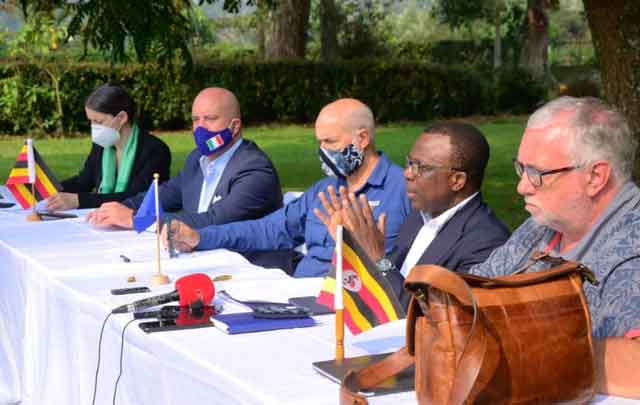
Fort Portal, Uganda | THE INDEPENDENT | The European Union (EU) Ambassadors to Uganda have appealed to government to consider having in place a comprehensive master plan that will ensure the resuscitation of the country’s tourism sector.
Tourism together with others sectors in the country have been hit by the Coronavirus (COVID-19) pandemic.
The sector came to a standstill in March after President Yoweri Kaguta Museveni announced the closure of all borders, together with Entebbe International Airport, followed by the suspension of both private and public transport, business premises and any form of public gatherings.
The measures meant that all tourist sites had to be shut to the public and this led to the cancellation of several bookings by foreign tourists as well as the cancellation of international events which Uganda was scheduled to host starting as early as February 2020.
Tourism is one of Uganda’s top foreign exchange-earners with annual receipts of US Dollars 1.6 billion brought in by 1.8 million tourists according to the Uganda Tourism Board (UTB). Out of the 1.8 million tourists, 1.3 million are foreigners while 500,000 are local tourists.
However according to Jeanne Byamugisha, the Executive Director Uganda Hotel Owners Association, this trend is about to change and Uganda expects to lose US Dollars 1.6 billion tourism revenue of which 45 percent comes from the hotel industry.
She also noted that a recent study by the United Nations Development Programme (UNDP) indicated that in five years’ time, Uganda will not have achieved the 1.6 million tourists who have been coming in annually due to the impact of COVID-19 pandemic and therefore limited revenue from the sector.
Uganda was targeting to hit 4 million tourists by 2020.
She said that something crucial like provision of tax holidays or a stimulus package has to be done for the sector to be resuscitated and bring in money for the country.
Byamugisha was speaking at a press briefing by the European Union delegation led by the EU Ambassador Attilio Pacifici on Saturday.
The delegation comprising of the Ambassador of France to Uganda Jules-Armand ANIAMBOSSOU, Italian Ambassador Massimiliano Mazzanti, the Ambassador of Belgium Rudi Veestraeten and the Austria Head of Office Dr. Roswitha Kremser have since Thursday camped in Western Uganda to assess the impact of COVID-19 on the Tourism Sector.
Ambassador Attilio Pacifici said that the EU is not seeking to solve the entire problem in the tourism sector but rather leading the way to ensure that the sector is revived.
The Belgian Ambassador Rudi Veestraeten said that Uganda needs an active response towards the tourism sector even before the pandemic is over.
“There is need to do something else in this country than to sit back and wait for the crisis to be over. If Uganda does that, it might take a long time before this sector recovers. The country needs to have a new master plan,” said Veestraeten.
He said that the new master plan should take into consideration of conserving what is in place, active support to private sector development and others.
Dr. Roswitha Kremser, the Austria Head of Office noted that the impact on the tourism sector does not only end with the operators but also communities that provide different goods and services to the tourism sites and accommodation facilities like food stuffs.
She said that there is need for Uganda to creatively re-boost the sector and that this is something they are going to discuss with different government agencies to forge a way forward.
The Ambassador of France to Uganda Jules-Armand ANIAMBOSSOU also noted that Uganda’s new approach in the tourism sector can concentrate on developing and protecting its eco-tourism, marketing differently and professionally and others.
For the Italian Ambassador Massimiliano Mazzanti, re-opening the country’s International Airport will be key in reviving the sector and ensuring that the economy fights the effects of the COVID-19 pandemic.
During their four day assessment of the COVID-19 impact on the tourism sector, the EU ambassadors interfaced with lodge and tourism operators in Kanungu, Kasese and Fort portal.
The delegation also commissioned a Ranger’s Outpost at Ishasha, Queen Elizabeth National Park that will accommodate rangers who protect the wildlife at the Park from poachers near the tourist site and those from the Democratic Republic of Congo (DRC). The Ambassadors also interacted with different businessmen in the tourism industry at Mweya Safari Lodge among others.
********
URN
 The Independent Uganda: You get the Truth we Pay the Price
The Independent Uganda: You get the Truth we Pay the Price





